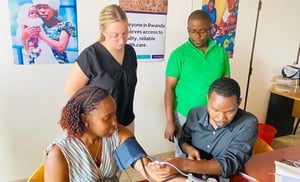New AHW-Funded Initiatives Will Improve Maternal Health Outcomes in Wisconsin
January 27, 2025 Posted by AHW Endowment

Maternal health outcomes in Wisconsin continue to face significant challenges, especially in rural areas where access to quality care is limited. These challenges are even more severe in Black communities, where mothers and infants experience higher health risks. From limited access to prenatal care to rising pregnancy complications, focused solutions are needed across the state.
To support meaningful change, the Advancing a Healthier Wisconsin Endowment (AHW) has recently invested in innovative research and community health programs. These new initiatives aim to address maternal health from multiple angles—whether it's studying pregnancy complications in the lab or providing hands-on support through community-based care—all to ensure healthier futures for Wisconsin mothers and babies.
Recently Funded Maternal Health Research at a Glance:
- Blood Clotting Disorders and Pregnancy Complications
- Fetal Heart Response to Medications
- Community Doula Support Program
- Safety of Non-Nutritive Sweeteners During Pregnancy
- Nutrition Support for Expecting Mothers
Blood Clotting Disorders and Pregnancy Complications
Blood clots during pregnancy can lead to serious health risks for both mother and baby, including pregnancy loss and dangerous complications like preeclampsia. For women with inherited blood disorders, these risks are even higher.
An MCW research team led by Sarika Gunjan, PhD (Pathology), received $50,000 in AHW Seed Funding to study Factor V Leiden, an inherited condition that makes blood more likely to clot. The team will examine how this common disorder affects pregnancy and what can be done to protect mothers who have it.
This work could help doctors better treat pregnant women with blood disorders, leading to safer pregnancies and healthier outcomes for Wisconsin families.
Click to learn more about this project: Assessing the Role of Immune Cells in Factor V Leiden-Associated Pregnancy Complications.
Fetal Heart Response to Medications
Most pregnant women need to take at least one medication during pregnancy, whether to treat health conditions they had before pregnancy or to treat new health conditions that develop during pregnancy. Understanding how these medicines affect developing babies, especially their hearts, is essential for ensuring safe care.
MCW’s Janette Strasburger, MD (Pediatrics), is leading a collaboration with UW-Madison to study this important issue, funded with a $250,000 AHW Momentum Grant. Using advanced heart monitoring technology, researchers will track how medications affect fetal heart rhythms in 30 mother-baby pairs.
This innovative research could make medication use during pregnancy safer, especially for communities where certain genetic differences affect how drugs are processed in the body.
Click to learn more about this project: Safer Medication Treatment during Pregnancy Using Fetal MCG and Pharmacological Modelling.
.png?width=630&height=356&name=Maternal%20Health%20Blog%20Image_1%20(1).png)
Community Doula Support Program
Research shows that support from doulas can significantly improve birth outcomes, yet many doulas serving Black communities face burnout and limited resources.
The Doula Village, working with MCW’s Christopher Simenz, MS, PhD (Institute for Health and Equity), secured $71,726 in AHW Seed Funding to strengthen doula services in southeastern Wisconsin. The program provides doulas with essential resources, including food boxes and culturally appropriate materials, to help better serve Black birthing families.
This innovative approach supports both doulas and the families they serve, working to reduce the disparities in maternal and infant health outcomes in Wisconsin's Black communities.
Click to learn more about this project: Nurturing the Nurturers.
Safety of Non-Nutritive Sweeteners During Pregnancy
Artificial sweeteners (non-nutritive sweeteners) are in many things we consume–diet sodas and beverages, foods, and even medicines. With nearly one-third of pregnant women consuming these sweeteners daily, understanding their effects on pregnancy has become increasingly important.
AHW invested $50,000 in Seed Funding for the first comprehensive study of how artificial sweeteners, particularly commonly used sucralose, might affect pregnancy. This project, led by MCW's Stephanie Olivier-Van Stichelen, PhD (Biochemistry), will focus on whether these sweeteners change how the placenta protects the developing baby from harmful substances.
This research could help create clearer guidelines about sweetener use during pregnancy, giving Wisconsin mothers better information for making healthy choices.
Click to learn more about this project: Impact of Sucralose Consumption During Pregnancy..png?width=630&height=356&name=Maternal%20Health%20Blog%20Image_1%20(2).png)
Nutrition Support for Expecting Mothers
Many Wisconsin families, especially in rural areas, struggle to access and prepare healthy foods–a challenge that becomes even more critical during pregnancy.
Great Rivers United Way and an MCW research team led by Abbey Kruper, PsyD (Obstetrics & Gynecology), received $76,945 in AHW Seed Funding to bring the "Nourishing Futures" program to Monroe and Jackson Counties. The program goes beyond basic nutrition advice, providing in-home support, cooking lessons, and kitchen supplies to pregnant and postpartum mothers enrolled in Medicaid.
By teaching practical cooking skills and providing real-world support, this program aims to help Wisconsin families build lasting healthy eating habits.
Click to learn more about this project: Nourishing Futures: Enhancing Maternal Child Health through Nutrition and Education.
Advancing Maternal Health in Wisconsin
These newly funded projects represent important steps toward better maternal and infant health across Wisconsin. From understanding biological complications to strengthening community care networks, each initiative addresses critical gaps in maternal health. Through strategic investments in both medical research and public health initiatives, AHW continues working to support healthier futures for Wisconsin mothers and their children.




.png?width=300&name=Funding%20Announcement%20(2).png)